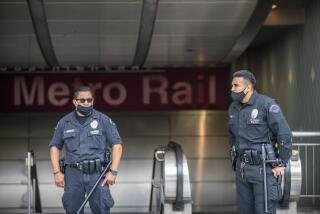Prison realignment plan costly for LAPD, report says
The state’s controversial push to relieve severe prison overcrowding has resulted in the Los Angeles Police Department taking dozens of officers away from regular patrol duties in order to monitor ex-convicts, according to a department report.
Since state officials implemented the prison measures in late 2011, the LAPD has had between 160 to 170 officers assigned full time to units responsible for keeping tabs on thousands of felons who are living in Los Angeles after their release from prison. Before the new rules went into effect, the felons would have been supervised by state parole officers.
The report, which was requested by the City Council’s Public Safety Committee and is scheduled to be discussed by the Police Commission on Tuesday, estimated the department will spend about $18 million of its payroll and equipment budget on these officers in the current fiscal year.
The tally brings into sharp focus the considerable added strain the state’s so-called prison realignment plan has had on the LAPD, which generally is considered to have too few officers to adequately patrol the sprawling city.
Under the terms of realignment, people convicted of less serious felonies -- generally speaking, those which were non-violent and did not have a sexual component -- are sentenced to county jail facilities instead of state prisons. Beyond this, however, a second component of the law called for low-level offenders serving time in state prisons to be released at the end of their sentences into the supervision of county probation officers instead of state parole officers.
Nearly 5,400 of these ex-convicts are living in Los Angeles, according to the report. From the outset of the realignment law, LAPD officials warned that the county’s Probation Department did not have nearly the size force needed to ensure such a large population of former prisoners were adhering to the terms of their probation.
“They had realignment thrust on them ... and have struggled to build up the capacity to provide effective supervision,” said LAPD Asst. Chief Michel Moore of the county’s probation department.
To close the gap, the LAPD formed compliance teams at each of its 21 stations, as well as a larger city-wide unit. The teams rate the risk posed by felons living in their area and identify the ones they believe are most likely to commit new crimes. Officers make unannounced visits to those felons’ homes to ensure they are actually living there and to check for weapons, drugs and other contraband.
When the department first set up the teams, police officials said their requests for financial help from the county had gone unheeded. Eventually, the LAPD received $2.2 million in county funds and expects a similar amount for the current fiscal year, Moore said.
The knowledge that a team of LAPD officers could show up is an important deterrent against felons committing new crimes or violating their probation, Moore said. Without the checks, he believes, crime rates in the city would probably be higher.
Even with the compliance checks, the LAPD has arrested about 3,100 of the felons -- 57% of the total in Los Angeles -- either on suspicion of committing new crimes or for probation violations, the report said.
Moore said he was hopeful that in the coming year the county Probation Department would increase the number of its officers who are assigned to work with the LAPD teams. Only five probation officers are embedded with the LAPD, but the department has asked for about 20.
ALSO:
Bay Area limo fire that killed 5 ‘accidental’; no charges to be filed
Dick Van Dyke ‘fine’ after rescue from his burning car on 101 Freeway
James DiMaggio left life insurance to Hannah Anderson’s grandmother
Twitter: @joelrubin
More to Read
Sign up for Essential California
The most important California stories and recommendations in your inbox every morning.
You may occasionally receive promotional content from the Los Angeles Times.











